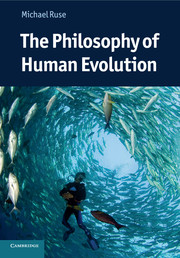2 - Human evolution
Published online by Cambridge University Press: 05 June 2012
Summary
And God said, Let us make man in our image, after our likeness: and let them have dominion over the fish of the sea, and over the fowl of the air, and over the cattle, and over all the earth, and over every creeping thing that creepeth upon the earth.
So God created man in his own image, in the image of God created he him; male and female created he them.
This is the story of human creation as given in Genesis (1:26–27), and with the coming of Christianity it was the story that was universally accepted for over 1,500 years. As noted in the first chapter, St. Augustine cautioned that one must be careful with demands that the Bible be interpreted literally. The story of human origins as given in Genesis shows the need of such a policy, for in the second chapter we get a rather different account, where woman is created as something of an afterthought to keep man happy and busy.
And Adam gave names to all cattle, and to the fowl of the air, and to every beast of the field; but for Adam there was not found an help meet for him.
And the LORD God caused a deep sleep to fall upon Adam, and he slept: and he took one of his ribs, and closed up the flesh instead thereof;
And the rib, which the LORD God had taken from man, made he a woman, and brought her unto the man.
And Adam said, This is now bone of my bones, and flesh of my flesh: she shall be called Woman, because she was taken out of Man. (Genesis 2:20–23)
The word from people like St. Augustine was that Christians should not spend their time trying desperately to reconcile texts like this but rather to spend time understanding the metaphorical or allegorical meanings that lie behind the words. The same is true when the text seems to conflict with up-to-date understanding in science and philosophy. The Bible was not written as a source of empirical information, but about God, humans, and their relationship. This does not mean that anyone doubted the Adam and Eve story – and there were of course good theological reasons for taking it fairly literally – but it does mean that the Christian tradition had within it the tools to work with science as and when the facts and theory demanded.
- Type
- Chapter
- Information
- The Philosophy of Human Evolution , pp. 39 - 65Publisher: Cambridge University PressPrint publication year: 2012



